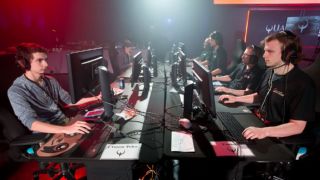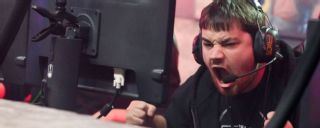|
LOS ANGELES -- An in-game arena opens up, and four creatures from opposite sides run out onto the stage like a shot from a cannon. A dinosaur in red armor jumps in rapid succesion to shoot at a robot carrying a bigger gun than its body can hold. Meanwhile, a character sporting a mohawk rides on a hoverboard and fires nails at another character with blue hair, exploding it into a smattering of digital red body parts. The remaining members of the surviving team transfer a glowing blue orb from the middle of the stage to their totem pole and side of the map. All of this action happens within the span of two minutes. This is the new Quake Champions, and its competitive mode, called Sacrifice, combines elements from capture the flag and king of the hill into one fast-paced mashup. It looks and sounds like the Quake of the early 2000s but with modern graphics and esports tools. Can one of the original stalwarts of competitive gaming bunny-hop into the top echelon of esports? Watching the action unfold at the Quake World Championships North American regional finals in Burbank, California, near Los Angeles, wondering whether this is a viable scene was at the forefront. The money is there, with $1 million on the line for the world championships finals later this month in Texas, but whether the audience follows remains to be seen. "This game will teach or reintroduce players to some of the signatures within Quake's engine and world," said Matt Charles, senior producer at id Software for Quake Champions. "With any kind of art, it's about staying relevant. You have to balance fiscal responsibility and delivering a unique experience to draw people in, but there's not a perfect road map for how to stay relevant." The core of Quake is iconic: It pits two players in an arena in a one-on-one deathmatch. The mechanics and fundamentals within the game are present in arguably all of the current first-person shooters that are popular today. Quake is one of the foundations of esports, and its place in history is deserving. But besides a shot of nostalgia and a little fun, what can this franchise offer in a space that is full of tactical team shooters? One of the event's commentators, John "BLU" Mullen, is optimistic that Quake's duels will fill a void in competition because there is a lack of player vs. player skill battles. "Nostalgia will be a big factor at first because people want to see Quake simply for the reason that it's Quake," Mullen said. "But the want is there for a duel game to fill a void and the development team is very willing to listen to the community to make this into a Quake title that can last for years to come."  It's early optimism, and Charles said the development team is paying close attention to the community. He said the game will have an evolving ladder system and a tutorial in-game to teach and reintroduce some of the classic Quake tools and mechanics. Quake's reputation as a shooter is one that rewards high skill and reaction time, but with the introduction of Sacrifice as a team mode, the pressure will not fall on just one person; rather, it will be a team rotating in and out of a series of duels. Tres "stunna" Saranthus, one of the hosts of the regional finals, offers his experience as to why first-person shooters are as popular as they are today. For stunna, a former Cloud 9 Counter-Strike: Global Offensive team manager, the idea that Quake can make a resurgence is exciting. "Shooters are easy to understand and a crowd favorite. In addition, there's another side where the players are building their own narratives," Saranthus said. "The average first-person shooter fan can relate to a professional player because the channels are available." The pitfalls for this franchise to return to its former glory were difficult to ignore. It was an arena shooter that played extremely quickly, its last gasp in the spotlight was over six years ago, and the core mechanics and gameplay were the same for nearly two decades. The addition of a team mode would provide different looks, but healthy skepticism was a prevalent theme throughout the tournament. "We had the fear of 'Are people going to like it?' and we didn't know until we received the feedback. They were not the people we wanted to anger," Charles said. "Quake is distinct because no other game is as fast. It's the F-1 racing of the first-person shooter genre. If you want to see fast gameplay at the highest level with ultra-responsive time, Quake is the pinnacle of skill. We see a long, healthy road with this game, and we're taking this very seriously as an esport." In the end, the game is nothing without its players, and both current and former professional "Quakers" were on board with the game. Victor "Makaveli" Cuadra was one of the analysts and commentators at the regional finals and was seen mostly around the players' area or the commentator's booth with a large smile on his face. For a player who was considered one of the best in the early 2000's, Makaveli was right back in his element. On the opposite side was one of the game's legends, Shane "rapha" Hendrixson. He was one of the game's most consistent stars from 2008 to 2012 and went right back to Quake when the new title was announced. Despite all his accomplishments, his celebrity was on the same level as that of any of the up-and-coming players who attended the regional final; the community was all on the same footing. "I've played Quake forever, and I love the game. It was time for me to go home," Rapha said. "The impact I could make and the additions to my legacy was enough motivation for me to come back for the potential of new tournaments in the future." It might be too soon to judge the future of Quake Champions, but the community and the game's developers have promised to offer support for the foreseeable future.
|

